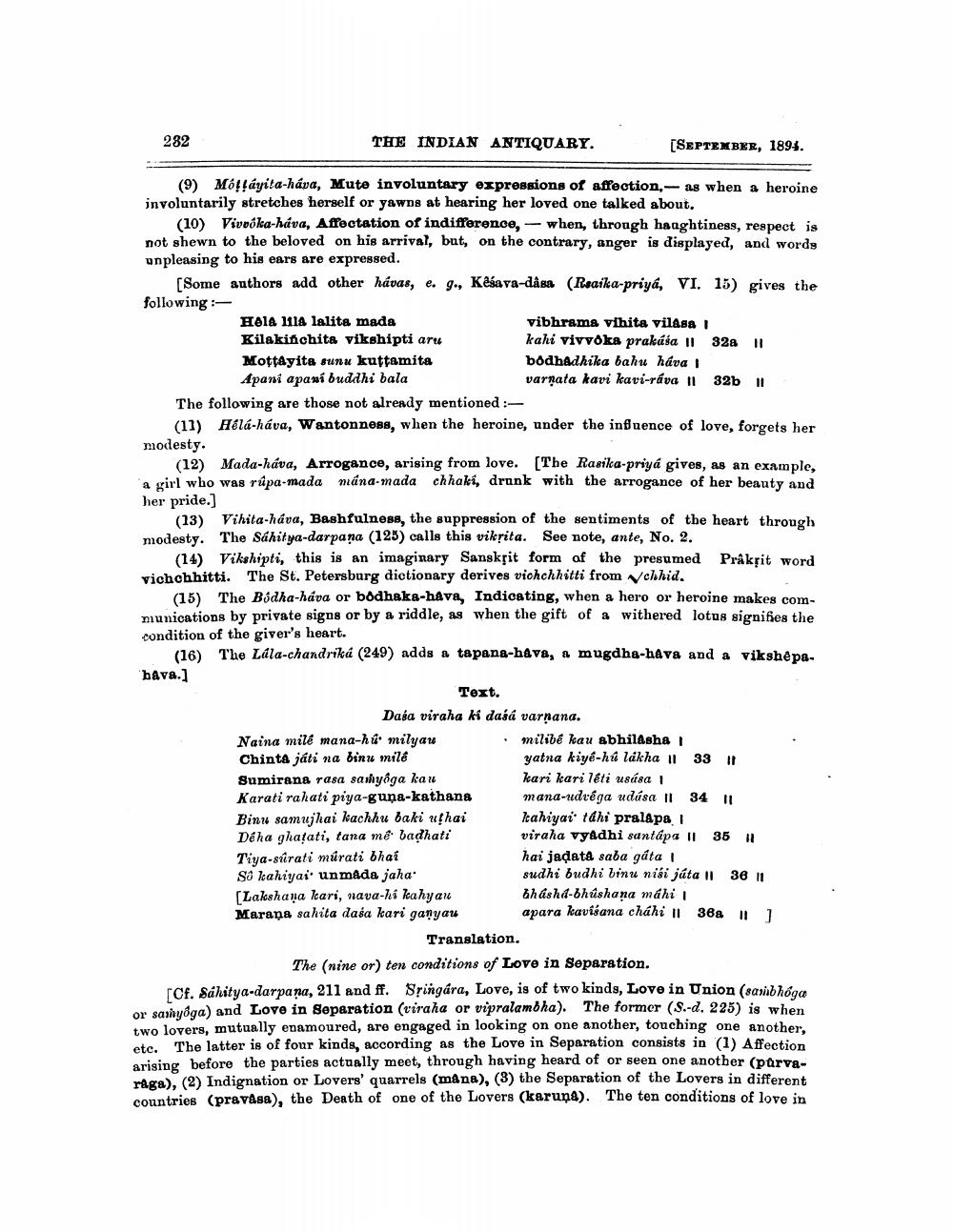________________
282
THE INDIAN ANTIQUARY.
[SEPTEXBER, 1894.
(9) Molláyita-háva, Mute involuntary expressions of affection, as when a heroine involuntarily stretches herself or yawns at hearing her loved one talked about.
(10) Vivvóka-háva, Affectation of indifference, when, through haughtiness, respect is not shewn to the beloved on his arrival, but, on the contrary, anger is displayed, and words unpleasing to his ears are expressed.
(Some authors add other havas, e. g., Késava-dâsa (Rsaika-priya, VI. 15) gives the following: Hola 1118 lalita mada
vibhrama vihita vilasa Kilakinchita vikshipti aru
kahi vivvoka prakása 11 32a 11 Mottayita sunu kuttamita
bodhadhika bahu háva 1 Apani apaní buddhi bala
varnata kavi kavi-ráva 11 32b11 The following are those not already mentioned :
(11) Hélá-háva, Wantonness, when the heroine, under the infuence of love, forgets her modesty.
(12) Mada-háva, Arrogance, arising from love. [The Rasika-priyá gives, as an example, a girl who was rupa-mada mana-mada chhaki, drunk with the arrogance of her beauty and her pride.)
(13) Vihita-háva, Bashfulness, the suppression of the sentiments of the heart through modesty. The Sahitya-darpana (125) calls this vikrita. See note, ante, No. 2.
(14) Vikshipti, this is an imaginary Sanskrit form of the presumed Prakrit word vichchhitti. The St. Petersburg dictionary derives vichchhitti from chhid.
(15) The Bsdha-háva or bodhaka-hava, Indicating, when a hero or heroine makes communications by private signs or by a riddle, as when the gift of a withered lotus signifies the condition of the giver's heart.
(16) The Lala-chandriká (249) adds a tapana-hava, a mugdha-hava and a vikshepa. hava.]
Text.
Dasa viraha ki dasá varnana. Naina milé mana-hú milyau • milibê kau abhilasha Chinta játi na binu milé
yatna kiyé-hú lakha il 33 !! Sumirana rasa sashyoga kau
kari kari léti usása Karati rahati piya-guna-kathana mana-udrega udása 11 34 11 Binu samujhai kachhu baki uthai kahiyai tahi pralapa 1 Déha ghatati, tana mê badhati
viraha vyadhi santapa 1135 !! Tiya-súrati murati bhai
hai jadata saba gáta Så kahiyai' unmada jaha.
sudhi budhi binu nisi játa || 36 11 [Lakshana kari, nava-hi kahyan
thashd-bhúshana mahi Marana sahita daśa kari ganyau apara kavisana chahi || 36& II ]
Translation. The (nine or) ten conditions of Love in Separation. rof. Sahitya-darpana, 211 and ff. Sfingara, Love, is of two kinds, Love in Union (savib hoon or sariyoga) and Love in Separation (viraha or vipralambha). The former (S.-d. 225) is when two lovers, mutually enamoured, are engaged in looking on one another, touching one another, etc. The latter is of four kinds, according as the Love in Separation consists in (1) Affection arising before the parties actually meet, through having heard of or seen one another (purvaraga), (2) Indignation or Lovers' quarrels (mana), (3) the Separation of the Lovers in different countries (pravasa), the Death of one of the Lovers (karuna). The ten conditions of love in




